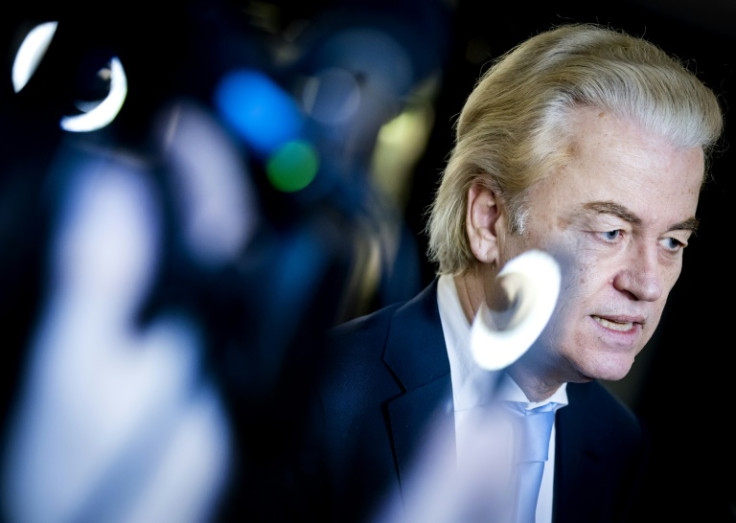Huge Blow For Wilders As Major Party Snubs Coalition

Far-right Dutch leader Geert Wilders suffered a major setback to his goal of forming a governing coalition Wednesday when a key potential partner ruled itself out, uncomfortable with his extreme views.
A week after Wilders sparked a political earthquake in the Netherlands and further afield with a stunning election victory, his task of building a coalition has become even more difficult.
The process is being closely scrutinised in Brussels and across Europe, given Wilders' anti-Islam, anti-immigrant, and anti-European manifesto, which also calls for a halt in weapons supplies to Ukraine.
Wilders needs the backing of 76 MPs in the 150-seat parliament for a working majority. His PVV Freedom Party shocked everyone by clinching 37 seats -- far beyond what polls had predicted.
His preferred coalition is with the BBB farmers party (seven seats), the all-new pro-reform New Social Party (20 seats) and the current ruling party, the centre-right VVD (24 seats).
The VVD has already ruled out participation, saying it would "support a centre-right coalition" from the opposition benches. The BBB and the NSC were seen as more amenable.
But the NSC and its popular leader Pieter Omtzigt said Wednesday it did not see a way of working with the PVV unless it clarified the more extreme parts of its manifesto.
"All in all, the NSC faction does not now see any basis to start talks with the PVV about a majority or a minority government," said a letter from Omtzigt to the "scout" charged with overseeing the negotiations.
The PVV manifesto "contains views which in our judgement go against the constitution... here we draw a hard line," said the letter.
The manifesto calls for a ban on mosques, headscarves and the Koran, as well as a referendum on a "Nexit" -- the Netherlands leaving the European Union.
Wilders moderated his tone during the election campaign and has stressed since election night that he wants to be prime minister "for all Dutch" regardless of race or religion.
"We notice that Mr Wilders has said he wants to put the relevant parts of his manifesto 'in the freezer'. But it is not clear what he means by this. What is the status of the PVV manifesto now?" asked the NSC.
Omtzigt's letter also set out "several obstacles" in terms of policy to working with the PVV, mentioning Ukraine, a Nexit, and fiscal soundness.
If a working coalition could not be formed, Omtzigt suggested, among other options, a "cabinet of experts" made up of non-politicians.
Wilders himself reiterated his call for the leaders of his preferred coalition to sit down together and "see what is possible."
He said he and his party were prepared to be "firm but reasonable" about their policies and that "no one should doubt that I am for all Dutch people, Christians, Muslims, or non-believers."
He has also raised the prospect of a minority government if he is unable to convince others to join him.
The process of forming a government in the fractured Dutch political system typically takes several months -- the last coalition of Prime Minister Mark Rutte took 271 days.
Wilders has said it can be achieved "in a couple of weeks" if all the parties came to the negotiating table but most experts think a government will not be announced before the middle of next year.
The process itself got off to a chaotic start when Wilders' hand-picked "scout", who shuttles between parties to see who can work with whom, quit over fraud allegations before negotiations even began.
© Copyright AFP 2025. All rights reserved.





















